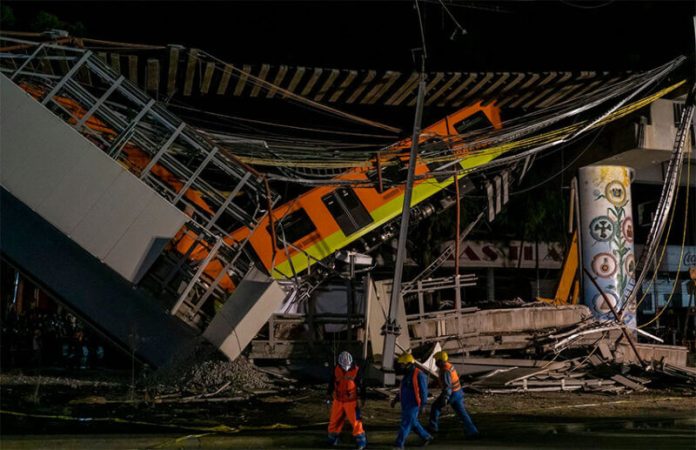Repairs to Line 12 of the Mexico City Metro system, where an accident in May claimed the lives of 26 people, will take a year, the city government said Tuesday.
On the advice of the government’s Technical Advisory Committee, a range of repairs will be undertaken.
The entire elevated section of the line will be reinforced with metal beams while the part that collapsed – causing a train to plunge toward a busy road below – will be completely rebuilt.
The underground section of the line, the Metro system’s newest, will also undergo repairs including the replacement of some sections of track and an overhaul of the drainage system. Tracks along the entire line will be re-leveled, all electrical infrastructure will be rehabilitated and wooden sleepers will be replaced by concrete ones, among other repair projects.
Two companies involved in the construction of the so-called Golden Line, which opened in 2012, will complete the repairs and cover their costs. Carso Infrastructure and Construction, owned by billionaire businessman Carlos Slim, will complete the work on the elevated section of the line, while Ingenieros Civiles Asociados will take charge of the subterranean stretch.
The total cost of the repairs and the plan that will guide them will be announced next week. Mexico City Mayor Claudia Sheinbaum said Tuesday that the government would only pay for repairs and maintenance work that was scheduled before the May 3 disaster occurred.
The entirety of the line, which runs across southern Mexico City from Mixcoac in the west to Tláhuac in the east, “will be safe and in a better condition than when we received it,” said Metro director Guillermo Calderón, who took charge of the system eight weeks after the accident occurred.
Sheinbaum said the repair work will begin as soon as possible. “… The topographic survey and a lot of other studies will begin this week,” she said.
President López Obrador said in late June that Line 12 would reopen within a year, but according to the Mexico City government’s timeline that won’t happen until late August 2022.
Sheinbaum said there was some possibility that the underground section of the line would begin operations before the elevated stretch, but noted that the proposition was unlikely because the line’s maintenance workshop is in Tláhuac.
“We would have to look for another place for maintenance; that’s why it’s important that both [sections] open at the same time,” she said.
Line 12, which serves mainly working class neighborhoods in the capital’s southeast, was built while Foreign Minister Marcelo Ebrard was mayor of Mexico City. It suffered some structural damage when a powerful earthquake struck the capital in September 2017.
Ebrard, who has announced he will seek to run for president in 2024, has rejected claims that the project was rushed to ensure that it was completed before his term as mayor ended in 2012.
He suggested in June that the May 3 crash could be linked to maintenance, asserting that it was impossible to know whether his successor as mayor, Senator Miguel Ángel Mancera, “conducted all of the maintenance work required in the event of earthquakes of a certain magnitude.”
With reports from El Universal and El País
